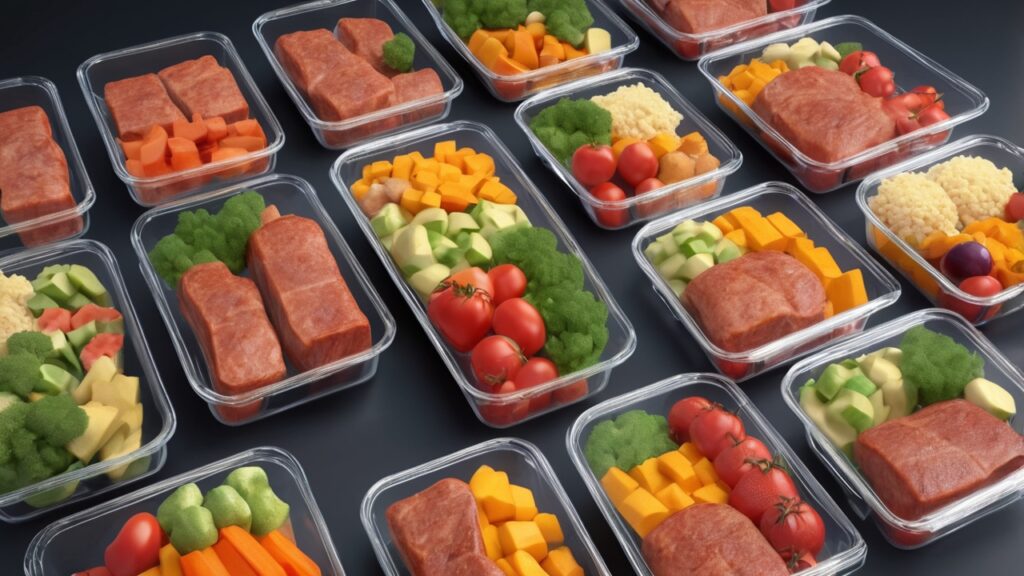Meal prepping is a game-changer for anyone looking to save time, eat healthier, and streamline their weekly routines. Whether you’re juggling a hectic schedule or just want to simplify mealtimes, meal prepping can be the key to achieving your goals. Here’s a detailed guide to help beginners master the art of meal preparation.
What is Meal Prep and Why is it Important?
Meal prepping involves preparing meals or ingredients in advance to save time and effort during the week. It’s a powerful tool for maintaining a balanced diet, reducing food waste, and avoiding unhealthy last-minute choices. Meal prep can be tailored to suit any dietary preference, making it an essential practice for beginners and experienced cooks alike.
Step-by-Step Guide to Simple Meal Prep
1. Plan Your Meals
Planning is the foundation of successful meal prep. Follow these steps:
- Choose Recipes: Select meals that match your dietary preferences and are easy to prepare.
- Consider Portions: Decide how many meals you need for the week and how many servings per meal.
- Balance Nutrients: Aim for a variety of proteins, vegetables, whole grains, and healthy fats in your meal plan.
2. Create a Grocery List
A well-thought-out grocery list ensures you have everything you need:
- Organize by Category: Divide your list into sections like produce, pantry, and dairy for efficient shopping.
- Stick to the List: Avoid impulse purchases to save money and reduce waste.
3. Invest in Meal Prep Tools
Having the right tools makes meal prep easier and more enjoyable:
- Containers: Use BPA-free, leak-proof containers in various sizes. Glass containers are a durable and eco-friendly choice.
- Kitchen Gadgets: Tools like a good chef’s knife, cutting board, and slow cooker can significantly reduce prep time.
- Labels: Label containers with meal names and dates for easy identification.
4. Schedule Your Prep Time
Dedicate a specific time each week to meal prep:
- Choose a Day: Sunday or Monday is ideal for many, but any day that suits your schedule works.
- Block Time: Allocate 2–3 hours for cooking, portioning, and storage.
Meal Prep Ideas for Beginners

1. Breakfast Options
- Overnight Oats: Combine oats, milk, chia seeds, and your favorite toppings in a jar for a quick grab-and-go breakfast.
- Egg Muffins: Whisk eggs, veggies, and cheese, then bake in muffin tins for a protein-packed start to your day.
- Smoothie Packs: Pre-portion fruits, greens, and seeds in freezer bags; just add liquid and blend when needed.
2. Lunch and Dinner Recipes
- Grain Bowls: Layer cooked quinoa, roasted veggies, and grilled chicken, then top with a tangy dressing.
- Stir-Fry Kits: Chop vegetables and pre-cook protein; stir-fry with sauce when ready to eat.
- Soups and Stews: Batch-cook hearty soups and store them in freezer-friendly portions.
3. Snacks and Sides
- Veggie Sticks and Hummus: Slice carrots, cucumbers, and celery for a crunchy, healthy snack.
- Energy Balls: Blend oats, nut butter, honey, and mix-ins like chocolate chips for a quick energy boost.
- Roasted Nuts and Seeds: Season with spices and roast for a nutrient-rich snack.
Tips for Storing and Reheating Meals
- Refrigeration: Store meals that will be eaten within 3–4 days in the fridge.
- Freezing: For meals meant for later, use freezer-safe containers and label them with dates.
- Reheating: Microwave meals in short intervals, stirring occasionally to ensure even heating.
Common Meal Prep Challenges and How to Overcome Them

1. Limited Time
Solution: Start small by prepping just one or two meals a week. Gradually increase as you become more comfortable.
2. Food Boredom
Solution: Incorporate different cuisines, spices, and textures into your meals to keep them exciting.
3. Spoilage
Solution: Stick to recipes with longer shelf lives and use vacuum-sealed containers to extend freshness.
Benefits of Meal Prep
- Saves Time: Reduces daily cooking and cleaning.
- Promotes Healthier Eating: Encourages portion control and balanced meals.
- Saves Money: Minimizes dining out and food waste.
- Reduces Stress: Simplifies decision-making during busy weeks.
FAQs About Meal Prep
Q: How long can prepped meals last in the fridge?
A: Most meals last 3–4 days in the refrigerator. Freeze meals for longer storage.
Q: Is meal prep only for specific diets?
A: No, meal prep is customizable for any diet, from keto to vegetarian to gluten-free.
Q: Can I meal prep without cooking?
A: Absolutely! You can prep salads, sandwiches, and snacks without using the stove or oven.
By following these steps and incorporating practical tips, meal prepping becomes a manageable and rewarding habit for beginners. Whether your goal is to save time, eat healthier, or reduce stress, this guide provides everything you need to get started.

Great News! You Do NOT Have to Give Up Your Favorite Bread, Sandwiches & Pizza to Follow a 100% Paleo or Ketogenic Diet…
Traditional Bread is the #1 Health Danger In Your Diet and Contains a Hidden Compound that Makes it Nearly IMPOSSIBLE to Burn Fat & Lose Weight! Click here for more details

